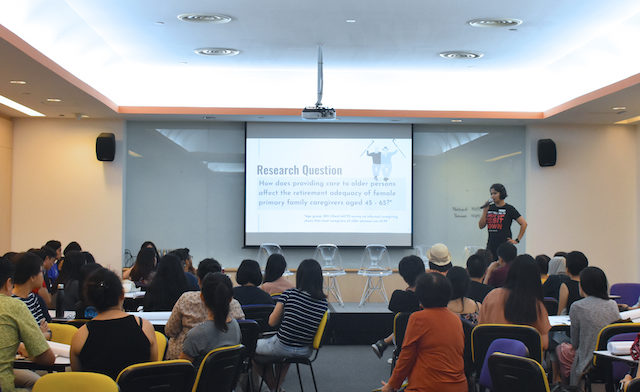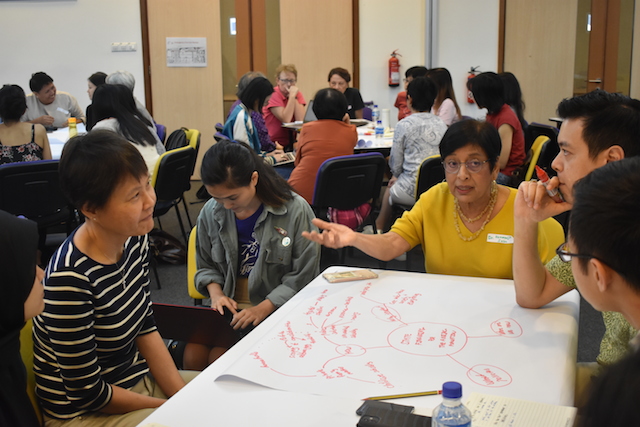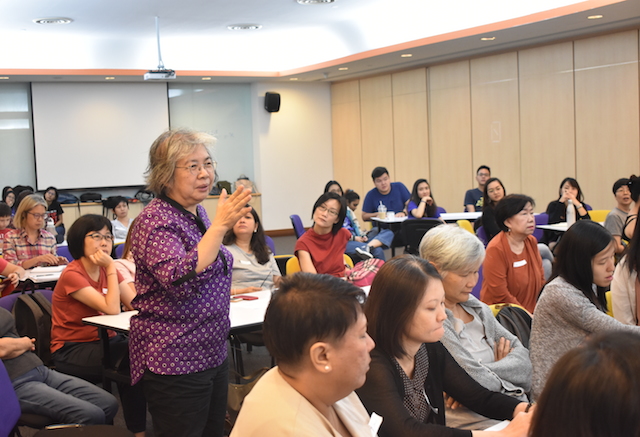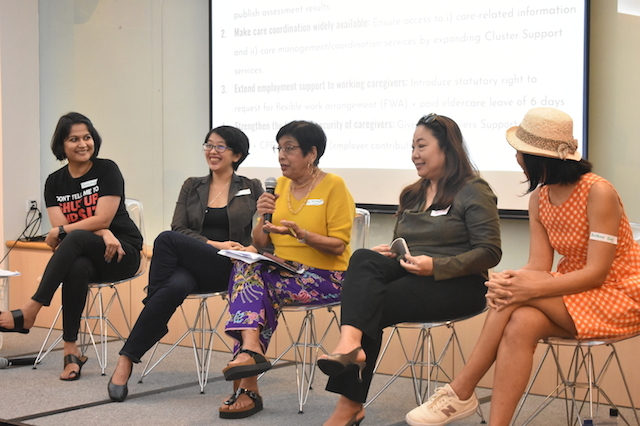-
Advocacy Theme
-
Tags
- Abortion
- Adoption
- Caregiving
- CEDAW
- Disability
- Domestic Violence
- Domestic Workers
- Harassment
- Healthcare
- Housing
- International/Regional Work
- Maintenance
- Media
- Migrant Spouses
- Migrant Workers
- Muslim Law
- National budget
- Parental Leave
- Parenthood
- Polygamy
- Population
- Race and religion
- Sexual Violence
- Sexuality Education
- Single Parents
- Social Support
- Sterilisation
- Women's Charter
A Recap: Make Care Count… in the National Budget
October 10th, 2019 | News, Older People and Caregiving
Written by Jasmine Gomez. Photographs by Kaspen Paraskakis Narayan.
“There are four kinds of people in the world: those who have been caregivers, those who are currently caregivers, those who will be caregivers, and those who will need a caregiver.” So said Rosalyn Carter, the First Lady of the United States from 1977 to 1981 and a pioneering caregiving advocate.
When Nominated Member of Parliament Anthea Ong referenced Carter’s words at AWARE’s “Make Care Count… in the National Budget” event on 5 October, 2019, they must have been familiar to many in the audience. After all, a Google search of the quote yields approximately 38,700,000 results.
Unfortunately, the fame of Carter’s sentiments does not necessarily reflect a commensurate level of acknowledgement and respect for caregivers around the world.
Even in rapidly ageing Singapore, despite some recent attention by local policy makers, caregiving remains undervalued. Its burden falls disproportionately on women, who often have little choice but to take on the responsibility of caring for older family members.
AWARE’s questions are: Do female caregivers in Singapore have to remain disadvantaged by caregiving—physically, emotionally, mentally and economically? How can the government provide more support?

Approximately 50 members of the public came together last Saturday morning to discuss those questions at the National Volunteer & Philanthropy Centre. “Make Care Count… in the National Budget” was a multi-part event: a public launch for AWARE’s new “Make Care Count” research report, a panel on eldercare in Singapore from the perspective of various stakeholders, and a discussion to devise concrete care-related policy recommendations, which will inform AWARE’s submission to the 2020 National Budget.
The panel comprised four speakers: Dr Joanne Yoong, senior economist at the University of Southern California; Kris Foo, a self-employed design consultant and primary caregiver to her elderly mother; NMP Anthea Ong; and Shailey Hingorani, head of research and advocacy at AWARE. The panel was moderated by Dr Kanwaljit Soin, AWARE founding member, former NMP and founding president of Society for WINGS.
Shailey kick-started the event with a presentation of “Make Care Count”—a qualitative study of 22 female caregivers in Singapore. The report found that a change in the caregiver’s employment status, be it a reduction of work hours or a complete withdrawal from the workforce, was almost inevitable as a result of caregiving responsibilities. For the respondents, this amounted to an average loss in income of $56,877 annually and, consequently, an average loss in employer CPF contributions of $7,705 per year on average. AWARE’s recommendations to counter this include: introduction of the statutory right to request flexible work arrangements (FWA), eldercare leave and family care leave, anti-discrimination legislation to deal with age-related and other forms of workplace discrimination, as well as a Caregiver Support Grant.
Dr Soin read a brief address on how gerontology and feminist scholarship have both traditionally left out the issues of older women. This lack of attention, she posited, coincides with the lessening of women’s social value as they physically age, as well as the financial instability that older women face as compared to their male counterparts. Additionally, caregiving—too often deemed a “woman’s duty”—is viewed as a private rather than public value in Singapore. Dr Soin then asserted the need for the feminist analysis of care to “move beyond documenting women’s predominance as caregivers and individual burdens and support, and address structural intersecting gender-based inequities that limit women’s choices as caregivers or as care recipients”.

Next, Kris shared her personal journey of caregiving, which she described as laden with loss “of not just a loved one, but financially, socially and [her] confidence”. As primary caregiver to her mother, who suffers from vascular dementia, anxiety and mild depression, Kris detailed the significant compromises she has made: working from home to attend to her mother, losing all semblance of a social life, managing foreign domestic workers who are typically untrained in eldercare, and depleting her savings. She is worried about the continuously changing market place, and the ageism she would face should she choose to go back to work full-time. She lamented: “Who is going to look after me when I am old? Everything feels so uncertain.”
Joanne shared her thoughts on the “invisible economic loss” that caregivers incur outside of the average dollars reflected on the balance sheet and ledger—also known as risk and uncertainty: “Part of the problem is that while we can tell you how much you will spend in a year, the premium attached to the uncertainty is huge because we don’t know how many years that’s going to be.” Pricing uncertainty is uncharted territory for our economic model.
Joanne also stressed the importance of supporting older workers who are coming back to the labour force after a caregiving hiatus. Such support, she said, should be about more than simply “giving them an ergonomic chair”; it should be more holistic and comprehensive.
Lastly, as a researcher herself, Joanne emphasised the need for further research. Only this, she said, can push policy-makers to focus their resources on true action.
Anthea, the final speaker, championed the need for caregiving to be prioritised within the overall Singaporean psyche: “Where I’m concerned, I think we’re not giving enough notice of this in terms of policy narratives.” Eldercare support is not, she argued, “something we can think of as ‘nice to have’”, because caregiving issues affect every single person. “My wish that for the upcoming budget, caregiving is not seen as just another segment that we need to look at, but one that should actually cut across the entire budget.”
Anthea weighed in on some the potential solutions towards easing the burden on female caregivers, such as the creation of a national database for caregivers—which, she pointed out, might be difficult to execute for various logistical reasons, including a possible reluctance of caregivers to come forward and readily identify themselves as such. Like Joanne, Anthea too believes that it is important to channel our resources into gathering data on caregiving. With this, she hopes, caregiving will one day be “institutionalised in such a way that there is no stigma or concern about how [caregivers’] employers will look at them”.

A panel discussion moderated by Dr Kanwaljit Soin followed after. Issues raised by the audience and speakers included the recognition of caregiving as a form of employment or civic duty that should be adequately remunerated, the diminished performance quality of employees forced to balance work and care without flexible arrangements, and the economic loss suffered by employers forced to grapple with caregiving-related turnover. One attendee also pointed out that subsidies for non-citizen care recipients would provide great financial relief for their Singaporean caregivers, who have to fork out significantly larger fees for services like daycare.
Following the panel discussion, participants split up into six groups. Over 30 minutes, they brainstormed suggestions to cover various aspects of caregiving:
- Financial support for singles
- State financing for the ageing population
- Work-place policies to improve work-life balance
- Care infrastructure and formal care services
- Re-employment and support for caregivers and/or older persons
Lastly, each group presented their suggestions to the floor. Their ideas ranged from encouraging more conversations about caregiving so as to remove the stigma about needing support, to shortening work weeks, and even channeling overall national savings from family caregiving towards a compulsory caregiver welfare.
AWARE will incorporate these suggestions into its submission to the National Budget in 2020.




